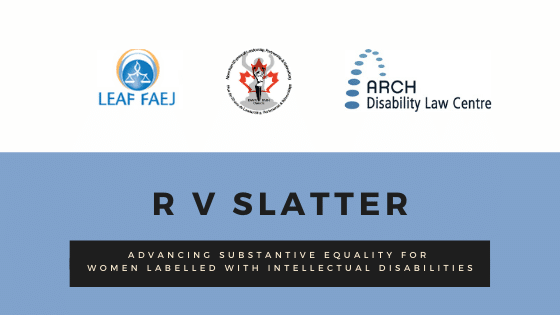
On May 19, 2020, the coalition consisting of LEAF, DisAbled Women’s Network Canada (“DAWN”) and ARCH Disability Law Centre (“ARCH”) was granted leave to intervene in R v Slatter to appear before the Supreme Court of Canada.
The LEAF-DAWN-ARCH coalition, represented by Suzan Fraser (Fraser Advocacy) and Kerri Joffe (ARCH), will advance an intersectional equality analysis highlighting the implications of the case on the substantive equality rights of women labelled with intellectual and/or developmental disabilities, and on their access to justice.
LEAF-DAWN-ARCH’s interest in the appeal
This case involves a woman labelled with an intellectual disability who disclosed sexual assault. At trial, defence counsel argued that the complainant’s evidence was unreliable, because her disability made her suggestible. The trial judge convicted the accused of sexually assaulting the complainant.
The majority of the Ontario Court of Appeal overturned the conviction and ordered a new trial, finding the judge’s reasons were not sufficient. In particular, the majority held that that the trial judge failed to address what they found to be a central issue: the complainant’s reliability and suggestibility.
Stereotypes about women labelled with intellectual disabilities should not be used to justify imposing a more onerous standard when assessing the reliability of evidence of complainants labelled with intellectual and/or developmental disabilities in relation to their testimony in sexual assault cases. Doing so will further silence the voices of these women. Such silencing is evident in the case under appeal. This has a deeply damaging impact on access to justice for women labelled with intellectual and/or developmental disabilities. It is particularly troubling, given the high rates of sexual assault among women with disabilities.
“This appeal is an important one for the LEAF-DAWN-ARCH coalition,” says Megan Stephens, Executive Director and General Counsel of LEAF. “Building on our past interventions in sexual assault appeals, our submissions will ensure that the Supreme Court appreciates how the imposition of a more onerous standard when assessing the reliability of evidence of complainants labelled with intellectual and/or developmental disabilities can undermine their substantive equality rights.”
“Equality rights for women and girls with disabilities have not been won yet in Canada,” says Bonnie Brayton, Executive Director of DAWN. “This case, which could substantially advance the concept of intersectional human rights as the desired framework, begins to move the courts and judicial system into the real world of victims of gender–based violence, where intersecting identities place some women at higher risk of being a victim, and can also make them less likely to be believed.”
“There are fundamental access to justice issues at stake for women with disabilities in this appeal,” states Robert Lattanzio, Executive Director of ARCH. “LEAF-DAWN-ARCH’s intervention focuses on the role of generalizations and stereotypes about women labelled with intellectual and/or developmental disabilities. These generalizations minimize the reliability of women with disabilities’ testimony in sexual assault cases, and have a deeply damaging impact on their access to justice.”
Case committee
LEAF-DAWN-ARCH’s arguments have been, and will be, informed and supported by a case committee composed of academics and practitioners with expertise in the relevant issues. The committee members for this intervention are (in alphabetical order): Shelley Fletcher (People First of Canada), Karine-Myrgianie Jean-François (DAWN), Barb McIntyre (Boost Child & Youth Advocacy Centre), Janet Mosher (Osgoode Hall Law School), Roxanne Mykitiuk (Osgoode Hall Law School), and Tess Sheldon (Faculty of Law, University of Windsor).
For background and judicial history of the case, see our earlier announcement.
About Women’s Legal Education and Action Fund (LEAF)
The Women’s Legal Education and Action Fund (LEAF) works to advance the substantive equality rights of women and girls through litigation, law reform, and public education. Since 1985, LEAF has intervened in landmark cases that have advanced equality in Canada—helping to prevent violence, eliminate discrimination in the workplace, provide better maternity benefits, ensure a right to pay equity, and allow access to reproductive freedoms.
About DisAbled Women Network Canada (DAWN)
Established in 1985, DAWN is a national, feminist, cross-disability organization that has provided opportunities for self-determination and leadership development for women and girls with disabilities for 35 years. DAWN’s mission is to end the poverty, isolation, discrimination and violence experienced by Canadian women with disabilities and Deaf women. DAWN works towards the advancement and inclusion of women and girls with disabilities and Deaf women and girls by creating change at a systemic level. DAWN has intervened before the Supreme Court of Canada on its own, or in coalition with LEAF, in numerous criminal and human rights-related cases.
About ARCH Disability Law Centre (ARCH)
ARCH is a specialty legal clinic, with a 40-year history of defending and advancing the equality rights and inclusion of persons with disabilities. ARCH is governed by a community-based board of directors, the majority of whom are persons with disabilities. ARCH provides legal advice directly to persons with disabilities in Ontario, conducts test case litigation before all levels of courts and tribunals, and maintains an extensive law reform practice. ARCH has particular expertise in human rights law, equality rights law and access to justice for persons with disabilities.
For media inquiries, contact:
Suzan E. Fraser
Fraser Advocacy
T : 416 703 9555
E : [email protected]
Kerri Joffe
Staff Lawyer
ARCH Disability Law Centre
E: [email protected]
